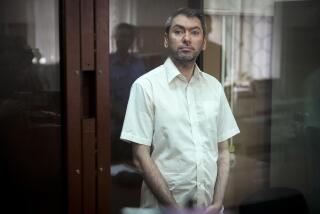Gorbachev’s Group Accused of Tax Fraud
- Share via
MOSCOW — Should anyone doubt how fleeting the honors of this world are, consider the recent twists of fate in the life and reputation of the 1990 Nobel Peace Prize laureate, Mikhail S. Gorbachev.
The former Soviet president flew out of Moscow on Friday afternoon on a commercial flight to attend the funeral in Berlin of yet another Nobel Peace Prize winner, former West German Chancellor Willy Brandt.
Most probably, Gorbachev was glad to go, even if it was to attend the burial of a friend.
For only a few hours before takeoff, yet more anti-Gorbachev charges were filling the Russian media. The think tank on Moscow’s Leningradsky Prospekt that he heads has now been accused of tax fraud and cooking the books.
According to the weekly publication Arguments and Facts, Yuri Danilevsky, head of financial inspection for the Russian Finance Ministry, has charged after an audit that the supposedly nonprofit Gorbachev Foundation made a profit of $70,000 during the first quarter of 1992 and failed to pay taxes on it.
The government auditor also said that the foundation--formally the International Foundation for Social, Economic and Political Research--did not pay $119,000 in value-added taxes and other levies due on revenues received from subletting office space and other facilities in its large headquarters building complex.
Having his think tank accused of tax dodging was just the latest indignity suffered by the former Kremlin leader, who recently had 75,000 of the 85,000 square feet occupied by the foundation seized by the Russian government. His passport was also impounded, although an exception was made to let him attend the rites for Brandt.
Earlier this week, the head of the Constitutional Court called Gorbachev a liar in everything but name. And his old nemesis, Russian President Boris N. Yeltsin, delivered another blow to Gorbachev’s good name by charging that he concealed important information about the 1983 downing of a South Korean passenger plane and the slaughter of 14,700 Polish officers by order of dictator Josef Stalin in 1940.
“It has turned out that he was not only the father of perestroika , but also a (Communist Party) general secretary in the old meaning of the word. He concealed much from the people and, maybe, he is afraid of it now,” court Chairman Valery D. Zorkin said acidly.
Zorkin has been trying unsuccessfully to force Gorbachev to testify before the tribunal.
On Thursday, Gorbachev vehemently denied covering up anything and said a “special file” he supposedly concealed was actually an entire roomful of 1,500 to 2,000 documents that he couldn’t have possibly read.
Yeltsin’s government countered Friday that a memo from Valentin M. Falin, former chief of the Communist Party’s International Department, dated Feb. 22, 1990, and signed by Gorbachev, showed he was “fully informed” about the massacre of the Poles.
Whatever the truth, the way much of the world looks at the statesman who made glasnost , or openness, his clarion call has probably been altered.
Only two years ago, the Norwegian Nobel Committee praised Gorbachev in these words: “During the past few years, dramatic changes have taken place in the relationship between East and West. Confrontation has been replaced by negotiations. Old European nations have regained their freedom.” No single person could have done all that, the committee said, but no one was more responsible than Gorbachev.
World leaders overwhelmingly agreed, but at home in the disintegrating Soviet Union, many citizens lashed out at Gorbachev as an ineffectual reformer, closet Communist tyrant or run-of-the-mill Russian chauvinist.
What’s now under way in Moscow looks like nothing less than an organized campaign to smear his international reputation.
The starting point is Gorbachev’s refusal to appear in Zorkin’s court, where, in a trial over the constitutionality of a ban on the Soviet Communist Party, he would face questioning about the party’s past.
Judge Zorkin says an important principle is involved--the equality of everyone before the law. To break Gorbachev’s stubborn resistance, an impressive part of the Russian state apparatus has been mobilized.
More to Read
Sign up for Essential California
The most important California stories and recommendations in your inbox every morning.
You may occasionally receive promotional content from the Los Angeles Times.










